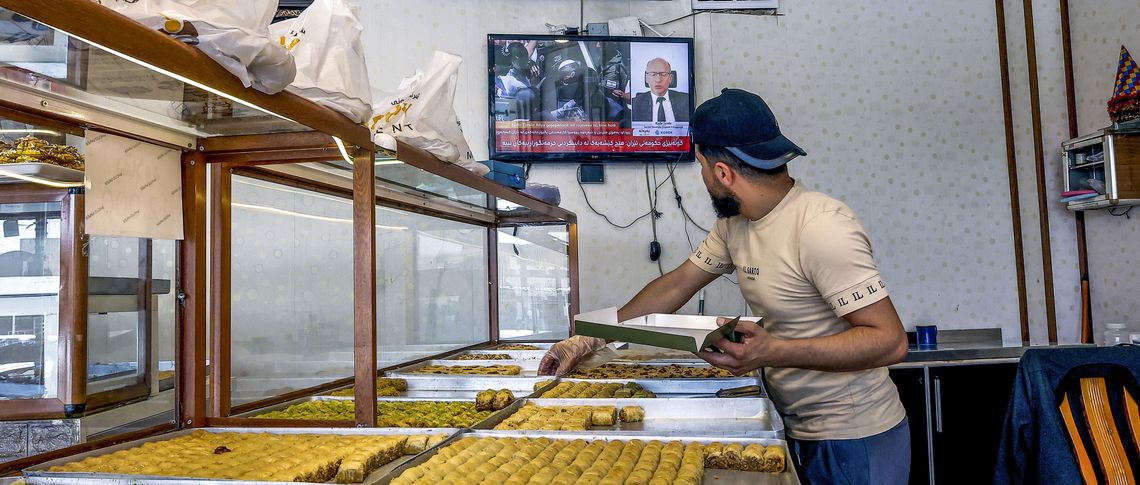The Middle East is once again confronted with a geopolitical test. While the world watches the dangerous power struggle between Iran and Israel, a country that lies geographically, historically and politically between the fronts must ask itself a question that it has not asked itself for too long: Whose interests are at the heart of our foreign policy — our own or those of others?
For years, Iran’s strategy has been to turn fragile states like Iraq, as well as Syria and Lebanon, into a forward defence line against its enemy, Israel, while empowering local proxies in these countries. In Iraq, this means arming, financing and exerting ideological influence on Shiite groups, some of which have long since created their own security structures — parallel to the state.
Iraq is unlikely to remain immune to the consequences of war.
This ‘axis of resistance’, which Tehran has been invoking rhetorically for years, was for a long time a closed system of such loyal proxies. But since 7 October 2023 – the day of the Hamas attack on Israel and the ensuing escalation – this system has been faltering. Contrary to its previous policy, the Iranian leadership conspicuously avoided direct military intervention. Instead, it focused on defending its own borders, showing a clear desire to avoid expanding the conflict.
This shift sparked questions among Iraqis: If Iran can prioritise its national interests, why can’t we do the same?
This question was not only discussed theoretically in Baghdad. Many Iraqi militias, backed by local political leaders and swayed by overt and covert American warnings, reacted promptly and decided to stay out of the acute escalation. Not out of a fundamental desire for peace, but out of political calculation.
Iraqi militias also made sure not to put Prime Minister Mohammed Shayya al-Sudani, who was keen on sparing the country from retaliatory strikes by the US and Israel, in a difficult position. At the same time, many of these militias are preparing for the parliamentary elections in November – either in new coalitions or as autonomous factions – paving the way for full integration into the political process and the potential abandonment of arms under external pressure.
Caught between interests
Still, Iraq is unlikely to remain immune to the consequences of war. From Iran’s perspective, Iraq is not merely a neighbour, but a strategic backbone. Shared history, religious affinity with Iraq’s Shiite majority (which makes up around 65 per cent of the population), economic interdependence — all of this makes this strategy viable. And in a state as fragile and saturated with weapons and corruption as Iraq, it wouldn’t take much for the country to slide into becoming a battleground or logistical corridor for Iranian-backed forces.
Moreover, Iraq’s deeply fractured political and sectarian scene, driven by a populist narrative tailored to the upcoming November elections, could push Iran-aligned factions to show direct support for Tehran by taking retaliatory action against US interests. Alternatively, escalations in the region could directly fuel sectarian rhetoric and the branding of secular opposition forces as traitors within Iraq’s electoral campaigns — taking advantage of the fact that these campaigns rarely rely on actual political or economic programmes as a way to convince voters to take part in the elections.
Should the Iran-Israel conflict intensify, Iraq could pay a heavy price. Closing the Strait of Hormuz, for example, could choke off 95 per cent of Iraq’s oil-export-dependent economy. Iraq would also struggle were the conflict to trigger a wave of migration from Iran since the country is ill-prepared to host hundreds of thousands, possibly millions, of refugees.
But it is not only in foreign policy that Iraq is under strain. The conflict with Israel also has toxic effects on domestic politics. Panic over alleged Mossad collaborators conducting stunning operations in Iran during the latest conflict, along with Iran’s collective punitive measures against Afghan refugees and rising racism targeting minorities (including Kurds, Baha'is, and Jews) on charges of collaborating with Israel, have echoed into Iraq. If the conflict continues, civil liberties may shrink further. Fearing threats, blackmail and legal harassment from Iran-linked militias, more bloggers, journalists and public figures may choose silence or flee to the relative safety of Kurdistan.
The case for neutrality and reform
In any case, Iraq urgently needs a clearer foreign policy, one grounded in neutrality, internal security, centralised leadership and regained control over all armed groups. It should also focus on securing its borders and strengthening intelligence cooperation with friendly nations to prevent the unauthorised movement of weapons and fighters.
Additionally, Iraq should engage with key regional players, such as Turkey, Saudi Arabia and Qatar, in efforts to de-escalate tensions. This could provide Baghdad with an opportunity to act as a platform for dialogue. In the long term, Iraq can only position itself as a stabilising force by actively participating in political solutions, rather than once again serving as a conduit for foreign interests.
The international community also has a role to play. But not with sanctions, which often affect the civilian population more than the political rulers.
The international community also has a role to play. But not with sanctions, which often affect the civilian population more than the political rulers. Instead, it can help Iraq navigate this period by actively supporting the ongoing reform processes in the security sector, encouraging Iraq’s integration into regional and global economic systems, accompanying fair elections and enabling economic openness. Only in this way can trust be strengthened — and the militias that currently control weapons and resources lose their raison d’être.
A large-scale war between Iran and Israel would be a strategic nightmare for Iraq — that is beyond dispute. But the crisis could also give rise to an opportunity: With political unity and proactive initiatives by the Iraqi government and with the help of the international community, Iraq has a chance to position itself as a force for stability rather than a battlefield. The question is: Will Iraq decide to weather the storm — or will it once again be swept away by it?






